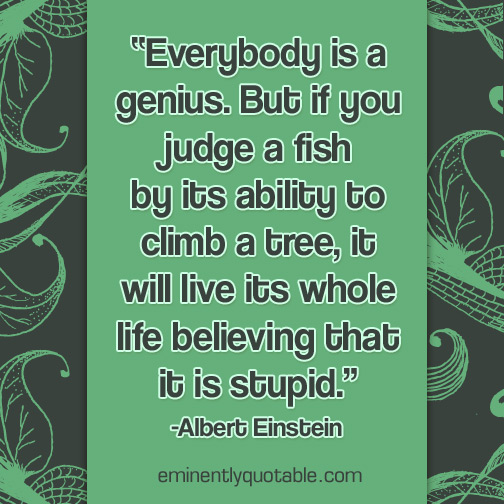
graphic © eminentlyquotable.com
“Everybody is a genius. But if you judge a fish by its ability to climb a tree, it will live its whole life believing that it is stupid.”– Albert Einstein
Albert Einstein (1879 – 1955) is considered the most famous theoretical physicist known for his general theory of relativity and his influence on the philosophy of science. In 1921, he was awarded the Nobel Prize for his “services to theoretical physics”, specifically his discovery of the law of the photoelectric effect.
As a child studying in Germany, his academic performance was not a manifestation of what he would become. Although quite knowledgeable in music, he was considered mentally slow because of the speech difficulty he had. However, Einstein had an inclination to scientific discoveries. In later years, he revealed in his writing that an encounter with a compass at the age of five was a turning point of his life. At age 12, his interest in math was incited by a geometry book which he read over and over again.
His quote above reveals his opposition to the widely held assumption of intelligence as a single general ability.
In the 1980’s, psychologist Howard Gardner proposed the theory of multiple intelligences that classified intelligence into eight types: linguistic, logical-mathematical, musical, bodily kinaesthetic, spatial, interpersonal, intrapersonal, and naturalist. Gardner dismissed the concept of testing multiple intelligences, saying that tests are not enough to measure performances and several factors have the potential to skew the results. Although his theory is met with criticisms, it has changed the way educators perceive cognitive abilities.
Einstein is one of the few visionaries who held open-minded and unconventional beliefs on knowledge. His wide range of interests was his way of saying that all intelligences are equally important.
😳 What Tinnitus Does To Your Brain Cells (And How To Stop It)
After 47 years of studies and countless brain scans done on more than 2,400 tinnitus patients, scientists at the MIT Institute found that in a shocking 96% of cases, tinnitus was actually shrinking their brain cells.
As it turns out, tinnitus and brain health are strongly linked.
Even more interesting: The reason why top army officials are not deaf after decades of hearing machine guns, bombs going off and helicopter noises…
Is because they are using something called "the wire method", a simple protocol inspired by a classified surgery on deaf people from the 1950s...
★ How To Get Rid Of Nail Fungus:
★ Does Your Salad Contain This Vegetable?
★ Top 10 Most Valuable Medicinal Herbs:





